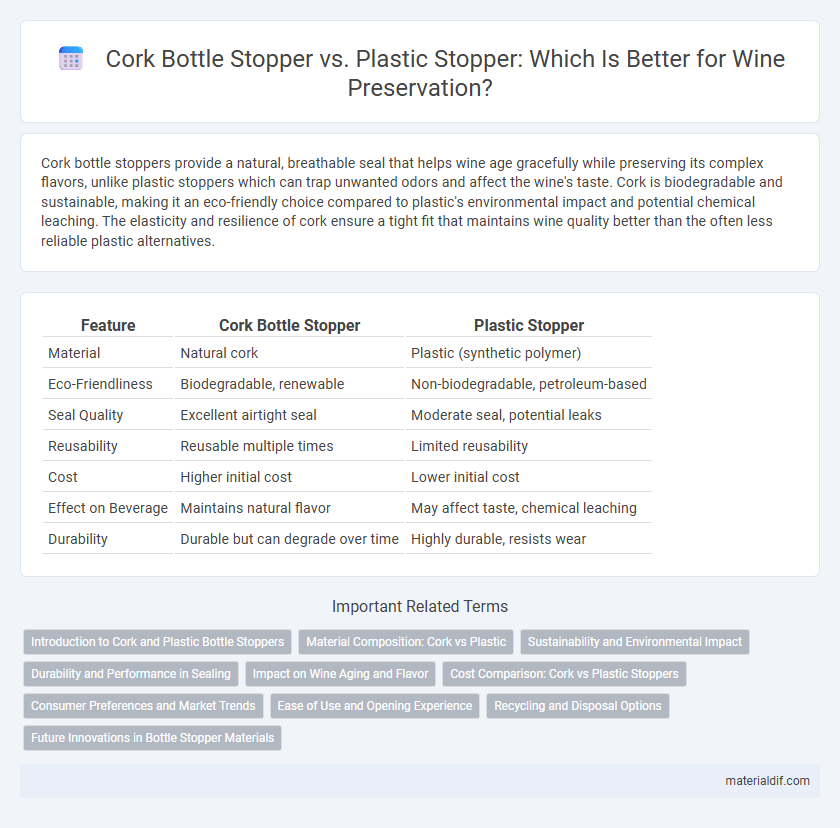Cork bottle stoppers provide a natural, breathable seal that helps wine age gracefully while preserving its complex flavors, unlike plastic stoppers which can trap unwanted odors and affect the wine's taste. Cork is biodegradable and sustainable, making it an eco-friendly choice compared to plastic's environmental impact and potential chemical leaching. The elasticity and resilience of cork ensure a tight fit that maintains wine quality better than the often less reliable plastic alternatives.
Table of Comparison
| Feature | Cork Bottle Stopper | Plastic Stopper |
|---|---|---|
| Material | Natural cork | Plastic (synthetic polymer) |
| Eco-Friendliness | Biodegradable, renewable | Non-biodegradable, petroleum-based |
| Seal Quality | Excellent airtight seal | Moderate seal, potential leaks |
| Reusability | Reusable multiple times | Limited reusability |
| Cost | Higher initial cost | Lower initial cost |
| Effect on Beverage | Maintains natural flavor | May affect taste, chemical leaching |
| Durability | Durable but can degrade over time | Highly durable, resists wear |
Introduction to Cork and Plastic Bottle Stoppers
Cork bottle stoppers, harvested from the bark of cork oak trees, offer natural elasticity and breathability, making them ideal for preserving wine quality by allowing minimal oxygen exchange. Plastic stoppers, often made from polyethylene or other synthetic polymers, provide a consistent seal and resistance to crumbling but may lack the eco-friendly and traditional appeal of cork. Both stopper types serve distinct roles in beverage preservation, with cork prized for its sustainability and heritage, while plastic focuses on durability and chemical inertness.
Material Composition: Cork vs Plastic
Cork bottle stoppers are made from natural bark harvested from cork oak trees, providing a renewable and biodegradable material with excellent elasticity and breathability that helps preserve wine quality. Plastic stoppers, typically composed of synthetic polymers like polyethylene or polypropylene, offer consistent sealing but lack the natural permeability and environmental benefits of cork. The natural cellular structure of cork allows for slight oxygen exchange, essential for aging wine, whereas plastic stoppers create an airtight seal that can sometimes lead to anaerobic conditions.
Sustainability and Environmental Impact
Cork bottle stoppers are highly sustainable due to their biodegradability and renewable harvesting from cork oak trees without harming the forest ecosystem. In contrast, plastic stoppers contribute to long-term environmental pollution because they are derived from non-renewable petrochemicals and often end up in landfills or oceans. Cork production supports biodiversity and carbon sequestration, making it a superior eco-friendly option compared to conventional plastic alternatives.
Durability and Performance in Sealing
Cork bottle stoppers offer natural elasticity and breathability, providing a reliable seal that allows wine to age properly, while plastic stoppers often lack this capacity, potentially compromising wine quality over time. Cork's cellular structure ensures durability and resistance to shrinkage, maintaining an airtight closure that prevents oxidation better than many plastic alternatives. In sealing performance, cork stoppers adapt to bottle neck irregularities, reducing leakage risks compared to less flexible plastic stoppers commonly used in the beverage industry.
Impact on Wine Aging and Flavor
Cork bottle stoppers allow for micro-oxygenation, which enhances wine aging by softening tannins and developing complex flavors, whereas plastic stoppers create an airtight seal that can inhibit these processes. The natural properties of cork contribute to wine maturation by allowing just the right amount of oxygen to interact with the wine over time. In contrast, plastic stoppers may preserve freshness but risk producing less nuanced flavor profiles due to limited oxygen exchange.
Cost Comparison: Cork vs Plastic Stoppers
Cork stoppers generally cost more upfront due to natural material sourcing and harvesting processes, averaging around $0.15 to $0.30 per unit compared to plastic stoppers at approximately $0.05 to $0.10 per unit. Despite higher initial costs, cork offers long-term value through biodegradability and superior sealing properties that can preserve wine quality better than plastic alternatives. Plastic stoppers may present savings in bulk purchase and manufacturing but typically lack the eco-friendly advantages and traditional appeal of cork.
Consumer Preferences and Market Trends
Cork bottle stoppers maintain strong consumer preference due to their natural origin, sustainability, and traditional association with quality wine preservation, driving steady market demand. Plastic stoppers gain traction in cost-sensitive segments, favored for their durability, consistent sealing, and resistance to cork taint, appealing to modern, mass-market producers. Market trends indicate a growing shift towards eco-friendly cork alternatives amid increasing environmental awareness, though plastic stoppers continue to hold share in convenience-focused applications.
Ease of Use and Opening Experience
Cork bottle stoppers offer a smooth, traditional opening experience with a natural elasticity that provides a secure seal while being easy to remove using standard corkscrews. Plastic stoppers, often found in budget bottles, can be simpler to insert and remove but may lack the refined tactile feedback and aroma preservation of cork. The ease of use in cork stoppers is enhanced by their ability to resist crumbling and maintain bottle integrity, making them the preferred choice for wine connoisseurs in Cork and beyond.
Recycling and Disposal Options
Cork bottle stoppers in Cork offer superior recycling and composting options compared to plastic stoppers, as natural cork is biodegradable and accepted by many local recycling programs. Plastic stoppers often end up in landfill due to limited recycling facilities and contribute to long-term environmental pollution. Choosing cork supports sustainable waste management practices and reduces plastic waste accumulation in Cork's recycling system.
Future Innovations in Bottle Stopper Materials
Cork bottle stoppers, derived from sustainable cork oak bark, continue to evolve with innovations enhancing their natural elasticity and sealing properties while reducing environmental impact. Emerging alternatives such as bio-based plastics and recyclable composite materials offer improved oxygen barrier performance and durability, positioning them as competitive options in premium wine preservation. Research into nanotechnology and biodegradable polymers aims to merge the eco-friendliness of cork with the customization and consistency of synthetic stoppers, driving future advancements in bottle closure technology.
Cork Bottle Stopper vs Plastic Stopper Infographic

 materialdif.com
materialdif.com